
Held, Anne Michaels (Bloomsbury)
Along with several poetry books Anne Michaels has previous published two other novels. I regard her first, Fugitive Pieces, as a masterpiece, yet Held is even better. It moves back and forward in time, and moves around Europe: France, Yorkshire, Suffolk, Estonia, Dorset and the Gulf of Finland. Whilst each chapter is clearly labelled with regard to both location and year, the juxtaposition of those years, jumps forward or back, mean we must keep an eye on what is memory, what is action, what is fact, what is nostalgia or later interpretation.
Starting in the war in 1917, we move chapter by chapter through 1920 to 1951, to 1984, then back in the same location to 1964, before returning to 1984. Then it is 1902, then 1980, then 1908, 1912, before we move to 2010 and end up in the near future in 2025. It is not a difficult read, it is not science fiction or experimental fiction, but it is a story told in sections that slowly coalesce as we understand and rethink what has gone before in the book.
It is a book about remembering and how open that act is to where someone is now, during that act of remembering, as well as what the cause or focus of that remembering is:
You could put a word in front of your thoughts and see
everything through that word — faith, family, illness. It
could be your own words or someone else’s, like wearing
glasses that were the wrong prescription — wrong, or
just not yours. Or, you could put your hands in front of
your eyes in denial — but even so, he thought, you would
continue to see, you can’t stop seeing what’s inside you.
There is a persistence to our memories, our brains contain so much that we might prefer to not rise to the conscious level:
Everything that stakes its claim in us, everywhere that
history stakes its claim in us. There are images that can,
like certain rhythms, dismantle us […]
Everything changes; this, and how memories inform and disform our lives, is what Michaels’ book is about. ‘A field becomes a battlefield; becomes a field again’, ‘[a] man who survived one war dies in another’, she writes, noting that although ‘[w]e think of history as moments of upheaval when forces converge’, ‘sometimes history is simply detritus: midden mounds, ghost nets, panoramic beaches of plastic sand.’
There are, of course, people, characters and events in this book, it is in no way a theoretical exercise in philosophy, linguistics or academic theory. John is hurt in WW1 which triggers recollections of his past, and once home and established as a photographer, ghosts both new and old, appear in his pictures. The book is also a family saga, an expansive and spreading family, with their own interpretations of moments they have shared, as well as the private ones and those they choose to keep to themselves. There are children, relationships, deaths and funerals; gardens in sunlight, rivers reflecting sunlight and then in flood; there are familial discontinuities and misrememberings, implied and future memories, and throughout the book ‘[t]he long fuse of memory, always alight.’ It is a warm, gentle and powerful novel; a book of moments, reimaginings, forgettings, disturbances and digressions. Anne Michaels has excelled herself once again.
.
Rupert Loydell
.
